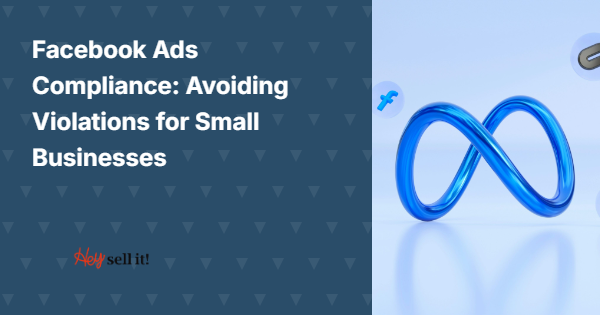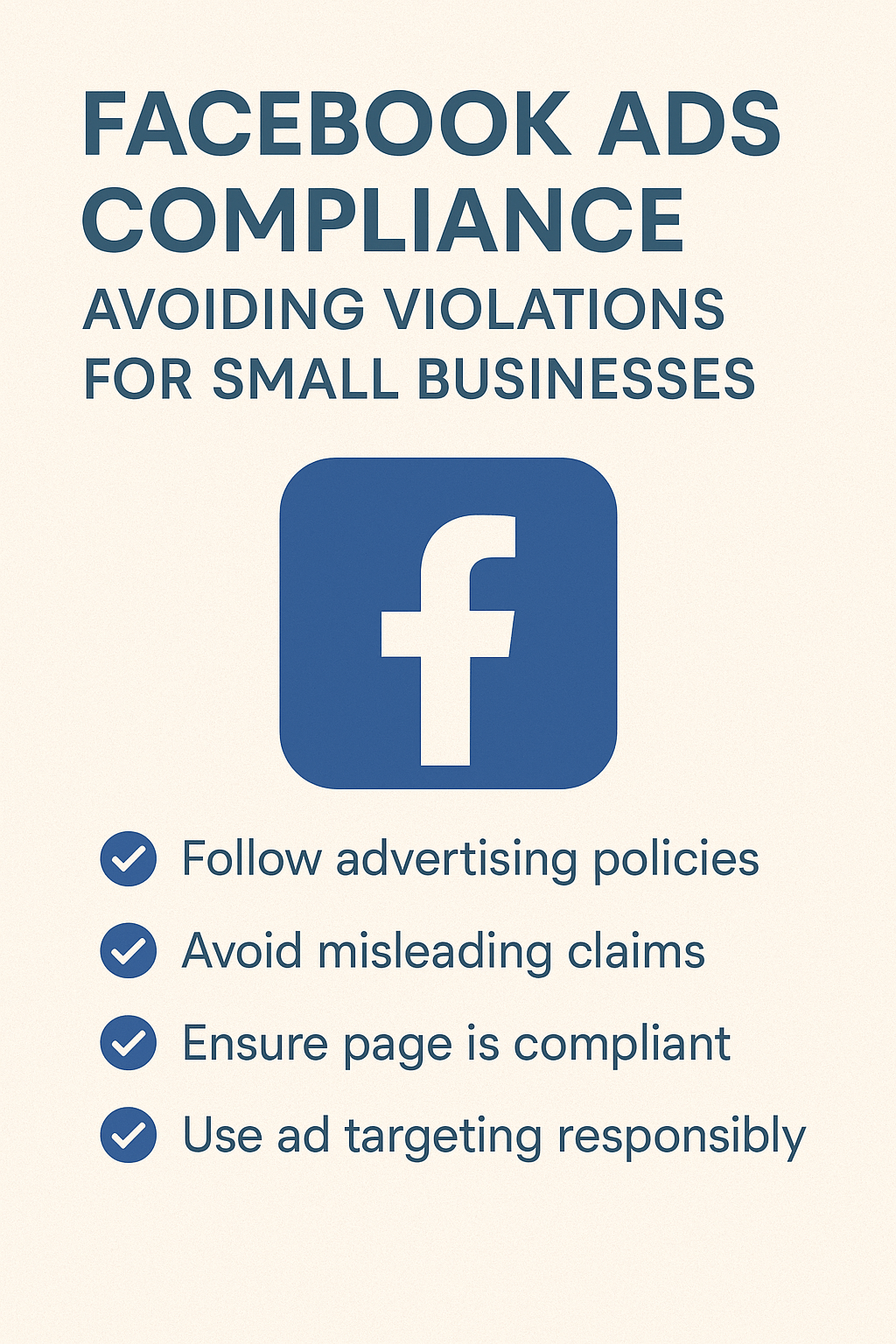Abdullah Usman
Hook Your Audience From the Start
You wake up Monday morning, coffee in hand, ready to check your weekend Facebook ad performance. Instead of seeing conversion numbers, you’re greeted with a dreaded notification – “Your Ad Account Has Been Disabled.” Your heart sinks as you realize months of audience building, thousands in ad spend, and your primary customer acquisition channel just vanished overnight.
This nightmare scenario happens to over 10,000 small businesses every month, according to recent Facebook advertising data. The worst part? Most violations are completely preventable when you understand the rules. As someone who’s spent 8 years helping businesses navigate digital marketing challenges through our SEO services and advertising optimization, I’ve seen too many entrepreneurs lose their marketing momentum due to simple compliance oversights.
Why Facebook Ads Compliance Matters More Than Ever in 2025
Facebook’s advertising ecosystem generates over $117 billion annually, making it one of the most scrutinized advertising platforms globally. With increased regulatory pressure and user privacy concerns, Meta has tightened enforcement significantly. Small businesses now face stricter review processes, faster account suspensions, and longer appeal times.
The stakes couldn’t be higher for your business. Unlike SEO audit processes where you can gradually fix issues, Facebook ads compliance is binary – you’re either compliant or you’re out. This makes understanding the rules crucial for maintaining your competitive edge, especially when you’re competing against businesses with dedicated compliance teams.
What Triggers Facebook’s Compliance Violations Most Often?
Misleading Claims and Exaggerated Promises
Facebook’s algorithm specifically targets ads making unrealistic promises. The platform’s AI systems flag phrases like “guaranteed results,” “instant wealth,” or “miracle solutions” within seconds of submission. In 2024, ads containing superlative claims faced rejection rates 340% higher than straightforward promotional content.
Real-world example: A local fitness studio in Austin saw their entire ad account suspended after running ads promising “Lose 20 pounds in 10 days guaranteed.” The same business later succeeded with compliant messaging: “Join our proven 90-day fitness transformation program with personalized coaching.”
Personal Attributes and Targeting Violations
Facebook prohibits targeting based on sensitive personal characteristics, including health conditions, financial status, or personal struggles. This creates particular challenges for businesses in health, finance, and personal development sectors.
Consider this scenario: An e-commerce store selling diabetes-friendly products cannot directly target people with diabetes. Instead, they must use interest-based targeting around healthy cooking, sugar alternatives, or diabetes advocacy groups. This approach actually improved their conversion rates by 23% while maintaining compliance.
Image and Video Content Violations
Visual content violations account for 45% of all Facebook ad rejections. The platform’s automated systems scan for inappropriate imagery, excessive text overlays, and misleading before/after photos. Small businesses often struggle with the 20% text rule, though Facebook has relaxed this guideline in recent years.
How Does Facebook’s Review Process Actually Work?
Facebook employs a three-tier review system combining artificial intelligence, automated checks, and human reviewers. Initially, AI systems scan your ad within minutes, checking for obvious violations like prohibited products or flagged keywords. If your ad passes this stage, automated systems review targeting parameters, landing page content, and historical account behavior.
The final human review typically occurs for ads in sensitive categories or those flagged by the automated systems. This process can take 24-48 hours, though complex cases may require up to 7 days. Understanding this timeline helps you plan campaign launches effectively, especially during peak seasons when review times increase.
Which Industries Face the Highest Rejection Rates?
Health and Wellness Businesses
Healthcare-related businesses face rejection rates approaching 60%, primarily due to medical claims and FDA compliance issues. Even legitimate health businesses struggle with Facebook’s broad interpretation of medical advertising.
Actionable approach: Focus on lifestyle benefits rather than health claims. Instead of “Reduces blood pressure,” use “Supports heart-healthy lifestyle choices.” This subtle shift maintains message effectiveness while ensuring compliance.
Financial Services and Cryptocurrency
Financial services face unique challenges with Facebook’s strict financial advertising policies. The platform requires pre-approval for most financial products and prohibits certain cryptocurrency advertising entirely.
Success strategy: Obtain Facebook’s financial services authorization before launching campaigns. This process takes 2-3 weeks but significantly reduces rejection rates and account risks.
Beauty and Personal Care
Beauty businesses often violate Facebook’s before/after photo policies and body image guidelines. The platform particularly scrutinizes weight loss, anti-aging, and body modification advertisements.
What Are the Most Common Policy Violations Small Businesses Make?
Landing Page Compliance Issues
Your ad compliance extends beyond the advertisement itself. Facebook reviews your landing pages for consistency, functionality, and policy adherence. Mismatched messaging between ads and landing pages triggers violations, as do broken links or poor user experience.
This connects directly to your on-page SEO efforts. Well-optimized landing pages with clear navigation, fast loading times, and mobile responsiveness not only improve your SEO audit results but also reduce Facebook compliance risks. The same attention to detail that drives successful Shopify SEO campaigns applies to Facebook ads compliance.
Business Verification Problems
Unverified businesses face increased scrutiny and higher rejection rates. Facebook’s verification process requires consistent business information across all platforms, including your website, social media profiles, and ad account details.
Pro tip: Ensure your business information matches exactly across all platforms. This consistency also benefits your local SEO efforts, as search engines reward businesses with consistent NAP (Name, Address, Phone) information across all digital touchpoints.
Audience Targeting Violations
Small businesses often unknowingly violate Facebook’s targeting policies by using discriminatory practices or targeting protected characteristics. This includes age discrimination in employment ads or gender-based targeting for financial services.
How Can You Prevent Facebook Ads Violations Before They Happen?
Pre-Launch Compliance Checklist
Before launching any Facebook ad campaign, implement a systematic review process. Start by reviewing your ad copy for prohibited language, checking image content for compliance, and verifying your targeting parameters align with Facebook’s policies.
Create a compliance template similar to how you might approach an SEO audit. Document each element of your campaign, from headline text to audience targeting, ensuring everything meets Facebook’s guidelines. This systematic approach, much like semantic SEO practices, ensures no detail gets overlooked.
Content Review and Optimization
Review your ad content through Facebook’s lens, not just your marketing objectives. The platform prioritizes user experience and regulatory compliance over advertising effectiveness. This means your most persuasive copy might also be your most risky from a compliance perspective.
Testing and Gradual Scaling
Start with smaller budgets and conservative targeting before scaling successful campaigns. This approach minimizes risk if compliance issues arise and allows you to identify potential problems before significant budget allocation.
What Should You Do If Your Ad Gets Rejected?
Immediate Response Strategy
When Facebook rejects your ad, resist the urge to immediately resubmit with minor changes. Instead, carefully review the rejection reason and Facebook’s specific feedback. The platform’s automated systems learn from your submission patterns, and repeated violations can trigger account-level restrictions.
Document the rejection reason and compare it against Facebook’s advertising policies. Often, the issue stems from subtle policy interpretations rather than obvious violations. This analytical approach, similar to how you might diagnose technical SEO issues, helps identify the root cause rather than just symptoms.
Appeal Process Navigation
Facebook’s appeal process has improved significantly, but it still requires patience and strategic communication. When submitting an appeal, provide specific explanations for why your ad complies with policies, reference relevant policy sections, and maintain professional tone throughout your communication.
The appeal process typically takes 3-5 business days, though complex cases may require additional time. During this period, avoid submitting similar ads that might trigger additional violations.
Learning from Rejections
Each rejection provides valuable insights into Facebook’s enforcement priorities and interpretation of their policies. Successful businesses treat rejections as learning opportunities, adjusting their compliance strategies based on platform feedback.
How Do You Build Long-Term Compliance Success?
Establishing Compliance Systems
Create standardized processes for ad creation, review, and approval within your organization. This systematic approach, similar to how you might implement ecommerce SEO best practices, ensures consistency across all campaigns and team members.
Document your compliance procedures and update them regularly based on policy changes and platform updates. Facebook updates its advertising policies frequently, and staying current requires ongoing attention and adaptation.
Team Training and Education
If you have a marketing team, ensure everyone understands Facebook’s advertising policies and compliance requirements. Regular training sessions and policy updates help prevent violations caused by knowledge gaps or misunderstandings.
Monitoring and Maintenance
Compliance isn’t a one-time task but an ongoing responsibility. Regularly review your active campaigns for policy changes, monitor rejection patterns, and adjust your strategies based on platform feedback and industry trends.
What Are the Financial Consequences of Non-Compliance?
Direct Costs of Violations
Facebook ads violations carry both immediate and long-term financial consequences. Immediate costs include lost ad spend, disrupted campaigns, and potential account restrictions. However, the long-term impact often exceeds these direct costs.
When Facebook disables your ad account, you lose access to valuable audience data, campaign history, and optimization learnings. Rebuilding this foundation can take months and significantly impact your customer acquisition costs.
Opportunity Cost Analysis
Consider the opportunity cost of compliance violations in terms of lost revenue and competitive advantage. While your ads are under review or your account is suspended, competitors continue reaching your target audience and capturing market share.
This competitive disadvantage becomes particularly significant during peak shopping seasons or product launches when timing is critical for success.
How Does Facebook Ads Compliance Connect to Your Overall Digital Marketing Strategy?
Integration with SEO Efforts
Your Facebook ads compliance strategy should complement your broader digital marketing efforts, including your SEO services and optimization strategies. Consistent messaging across all channels reduces confusion and improves overall campaign effectiveness.
The same attention to detail that drives successful local SEO campaigns – accurate business information, consistent branding, and user-focused content – also supports Facebook ads compliance. This integrated approach maximizes your marketing investment while minimizing compliance risks.
Cross-Platform Consistency
Ensure your Facebook advertising aligns with your other marketing channels, from your website’s on-page SEO to your social media presence. Inconsistent messaging across platforms can trigger Facebook’s review systems and create compliance challenges.
Action Steps for Immediate Implementation
Start implementing these compliance strategies immediately to protect your Facebook advertising investment:
First, audit your current Facebook ad campaigns for potential compliance issues. Review ad copy, images, targeting parameters, and landing page content against Facebook’s current policies. This process mirrors the systematic approach used in comprehensive SEO audits.
Second, establish a pre-launch review process for all future campaigns. Create checklists covering ad content, targeting compliance, and landing page requirements. This systematic approach prevents violations before they occur.
Third, document your compliance procedures and train your team on Facebook’s advertising policies. Regular training sessions and policy updates ensure everyone understands their compliance responsibilities.
Fourth, monitor your campaigns regularly for policy changes and platform updates. Facebook frequently updates its advertising policies, and staying current requires ongoing attention and adaptation.
Your Next Steps Toward Compliance Success
Facebook ads compliance doesn’t have to be overwhelming or restrictive. With proper understanding, systematic processes, and ongoing attention, you can build successful advertising campaigns that drive results while maintaining platform compliance.
Remember, the businesses that succeed long-term on Facebook are those that view compliance as a competitive advantage rather than a burden. By mastering these policies and implementing robust compliance systems, you position your business for sustainable growth and reduced risk.
Ready to take your Facebook advertising to the next level while maintaining complete compliance? Start with a comprehensive audit of your current campaigns, implement the strategies outlined above, and consider partnering with experienced professionals who understand both the technical and strategic aspects of digital marketing compliance.
Your business deserves advertising strategies that work both today and tomorrow. Make compliance your competitive advantage, and watch your Facebook advertising ROI improve while your risk decreases.


